Fall 2024 Course Offerings
Register for Fall 2024 GWS and SJ Courses!
For more information on Fall 2024 Gender and Women's Studies (GWS) and Social Justice (SJ) course offerings, please contact Associate Director Dr. Chez Rumpf, Director of Undergraduate Studies Dr. Nadine Naber, Director of Graduate Studies Dr. Gayatri Reddy, or Undergraduate Advisor for Majors and Minors Hideaki Noguchi.
Interested in an independent study with GWS faculty? Contact Associate Director Dr. Chez Rumpf to find out how!
Fall 2024 Gender & Women's Studies and Social JusticeCourses Heading link
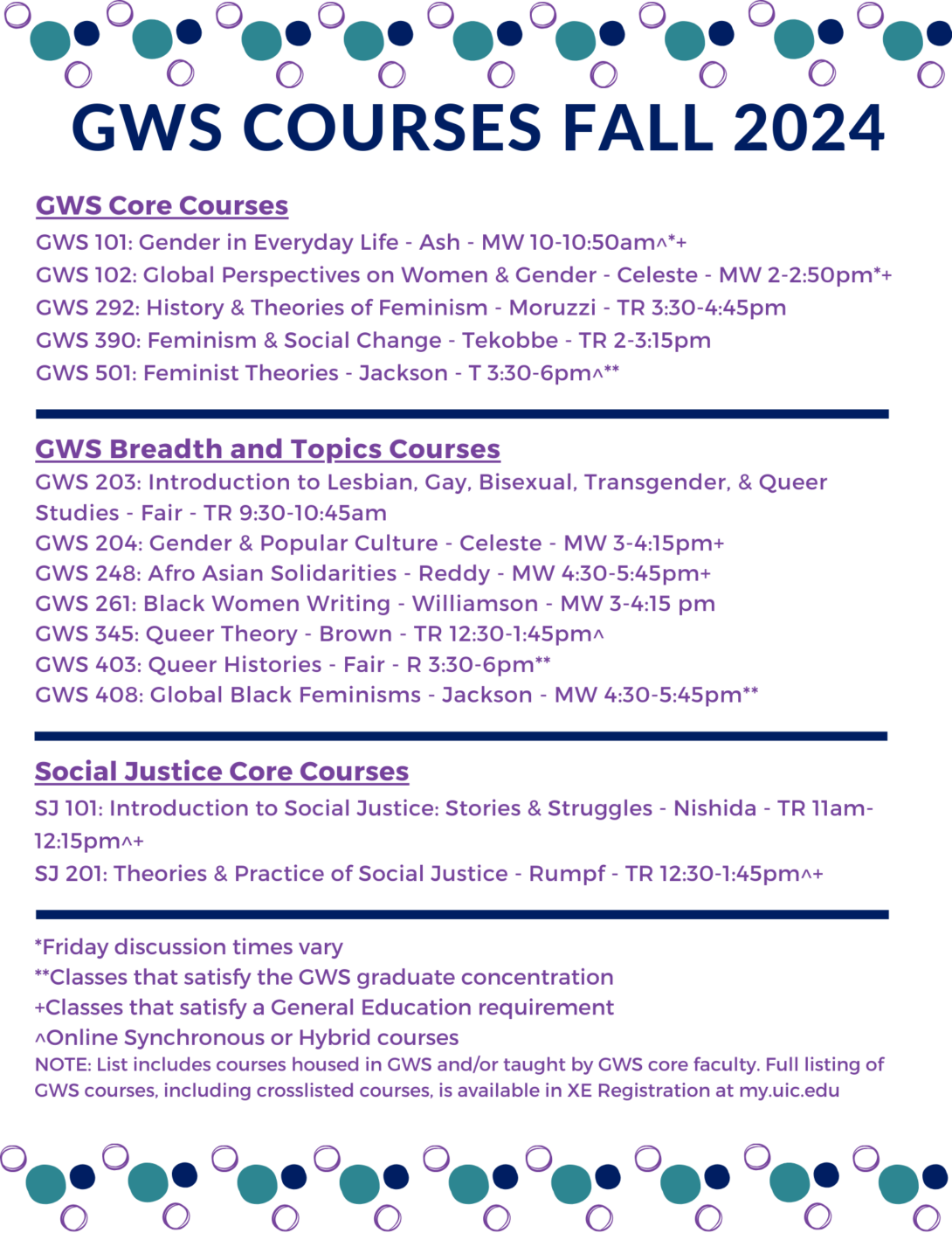
Check out Gender & Women’s Studies and Social Justice course descriptions here!
This flyer includes courses housed in GWS and/or taught by GWS core faculty. Review the full listing of GWS courses, including crosslisted courses, in XE Registration, available at my.uic.edu.
GWS 101 Heading link
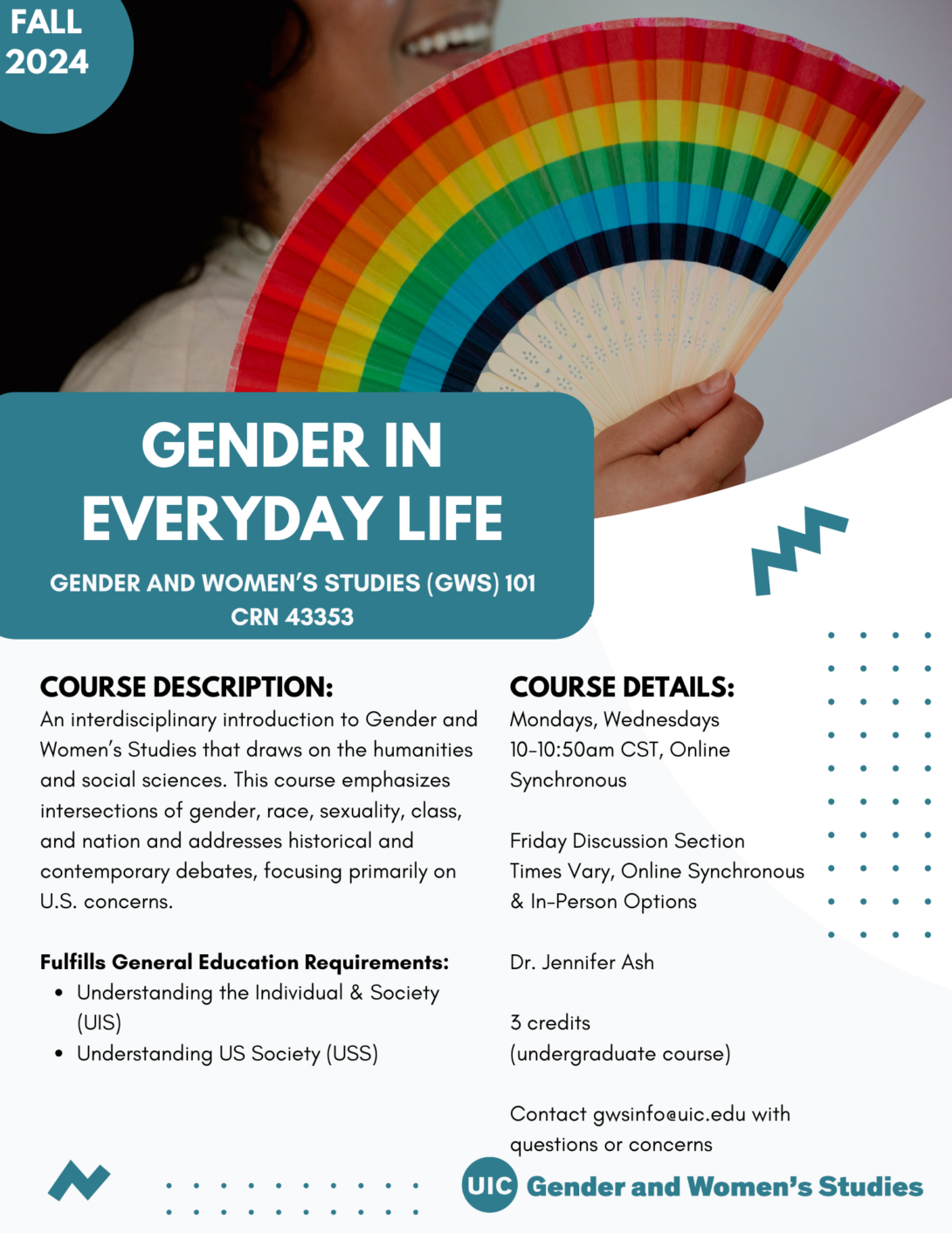
GWS 101 Gender in Everyday Life, CRN 43353
Course Description: An interdisciplinary introduction to Gender and Women’s Studies that draws on the humanities and social sciences. This course emphasizes intersections of gender, race, sexuality, class, and nation and addresses historical and contemporary debates, focusing primarily on U.S. concerns.
Fulfills General Education Requirements:
Understanding the Individual & Society (UIS)
Understanding US Society (USS)
Course Details:
Online Synchronous, Mondays and Wednesday 10-10:50 a.m. CST
Friday Discussion Section Times Vary, Online Synchronous & In-Person Options
Instructor: Dr. Jennifer Ash
3 credits (undergraduate course)
GWS 102 Heading link
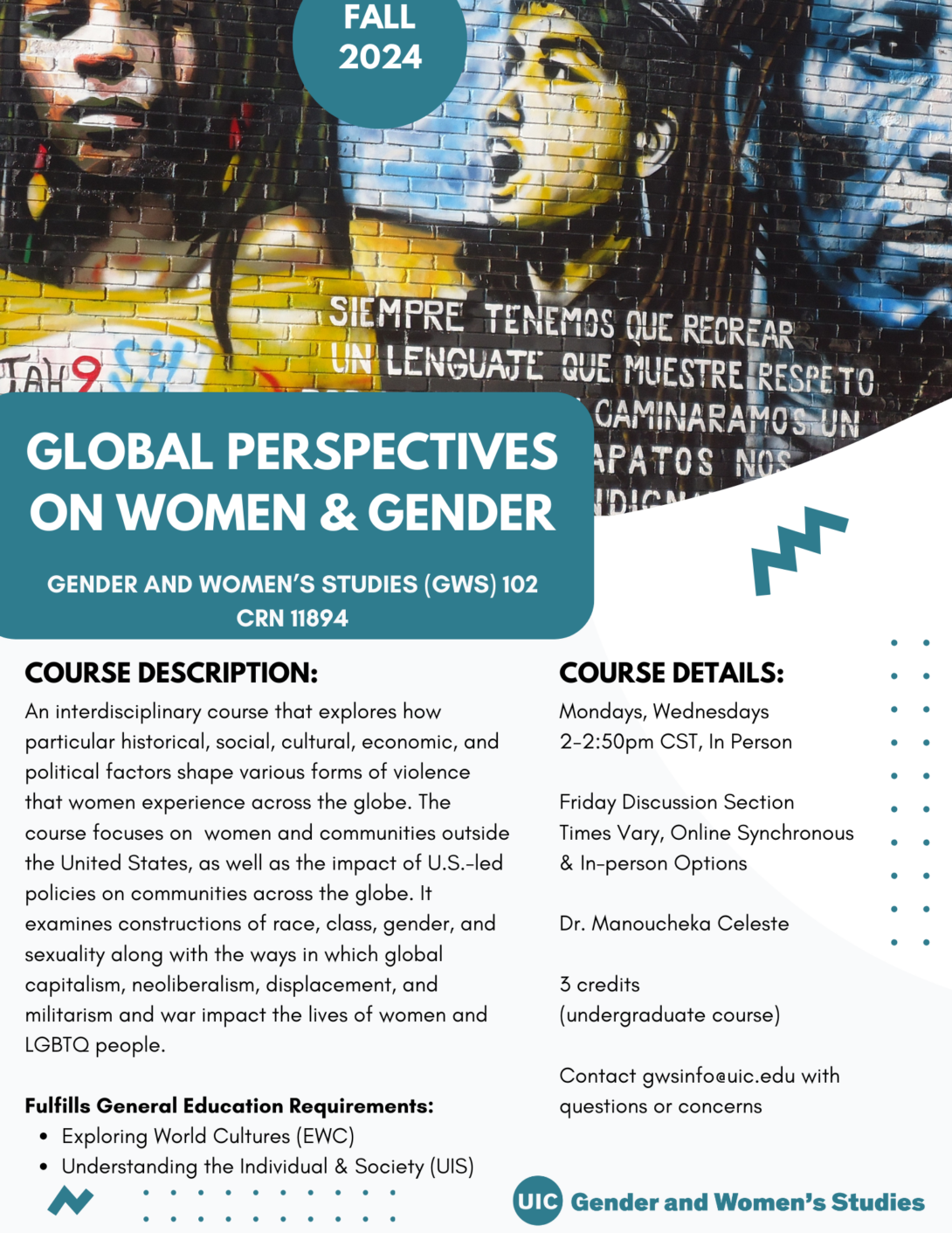
GWS 102 Global Perspectives on Women and Gender, CRN 11894
Course Description: An interdisciplinary course that explores how particular historical, social, cultural, economic, and political factors shape various forms of violence that women experience across the globe. The course focuses on women and communities outside the United States, as well as the impact of U.S.-led policies on communities across the globe. It examines constructions of race, class, gender, and sexuality along with the ways in which global capitalism, neoliberalism, displacement, and militarism and war impact the lives of women and LGBTQ people.
Fulfills General Education Requirements:
Exploring World Cultures (EWC)
Understanding the Individual & Society (UIS)
Course Details:
In Person, Mondays and Wednesdays 2-2:50 p.m. CST
Friday Discussion Section Times Vary, Online Synchronous & In-Person Options
Instructor: Dr. Manoucheka Celeste
3 credits (undergraduate course)
GWS 203 Heading link
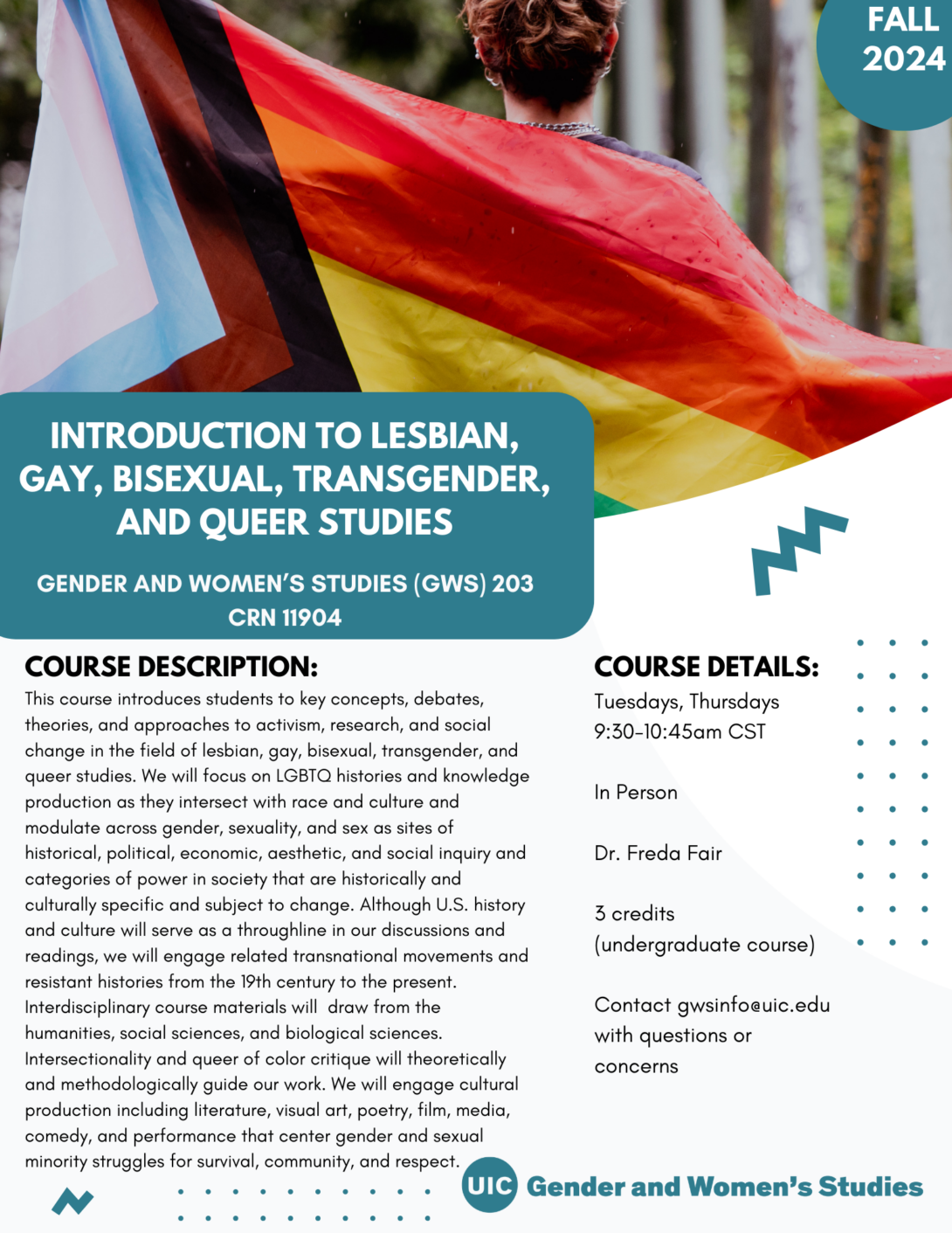
GWS 203 Introduction to LGBTQ Studies, CRN 11904
Course Description: This course introduces students to key concepts, debates, theories, and approaches to activism, research, and social change in the field of lesbian, gay, bisexual, transgender, and queer studies. We will focus on LGBTQ histories and knowledge production as they intersect with race and culture and modulate across gender, sexuality, and sex as sites of historical, political, economic, aesthetic, and social inquiry and categories of power in society that are historically and culturally specific and subject to change. Although U.S. history and culture will serve as a throughline in our discussions and readings, we will engage related transnational movements and resistant histories from the 19th century to the present. Interdisciplinary course materials will draw from the humanities, social sciences, and biological sciences. Intersectionality and queer of color critique will theoretically and methodologically guide our work. We will engage cultural production including literature, visual art, poetry, film, media, comedy, and performance that center gender and sexual minority struggles for survival, community, and respect.
Course Details: In Person, Tuesdays and Thursdays 9:30-10:45 a.m. CST
Instructor: Dr. Freda Fair
3 credits (undergraduate course)
GWS 204 Heading link
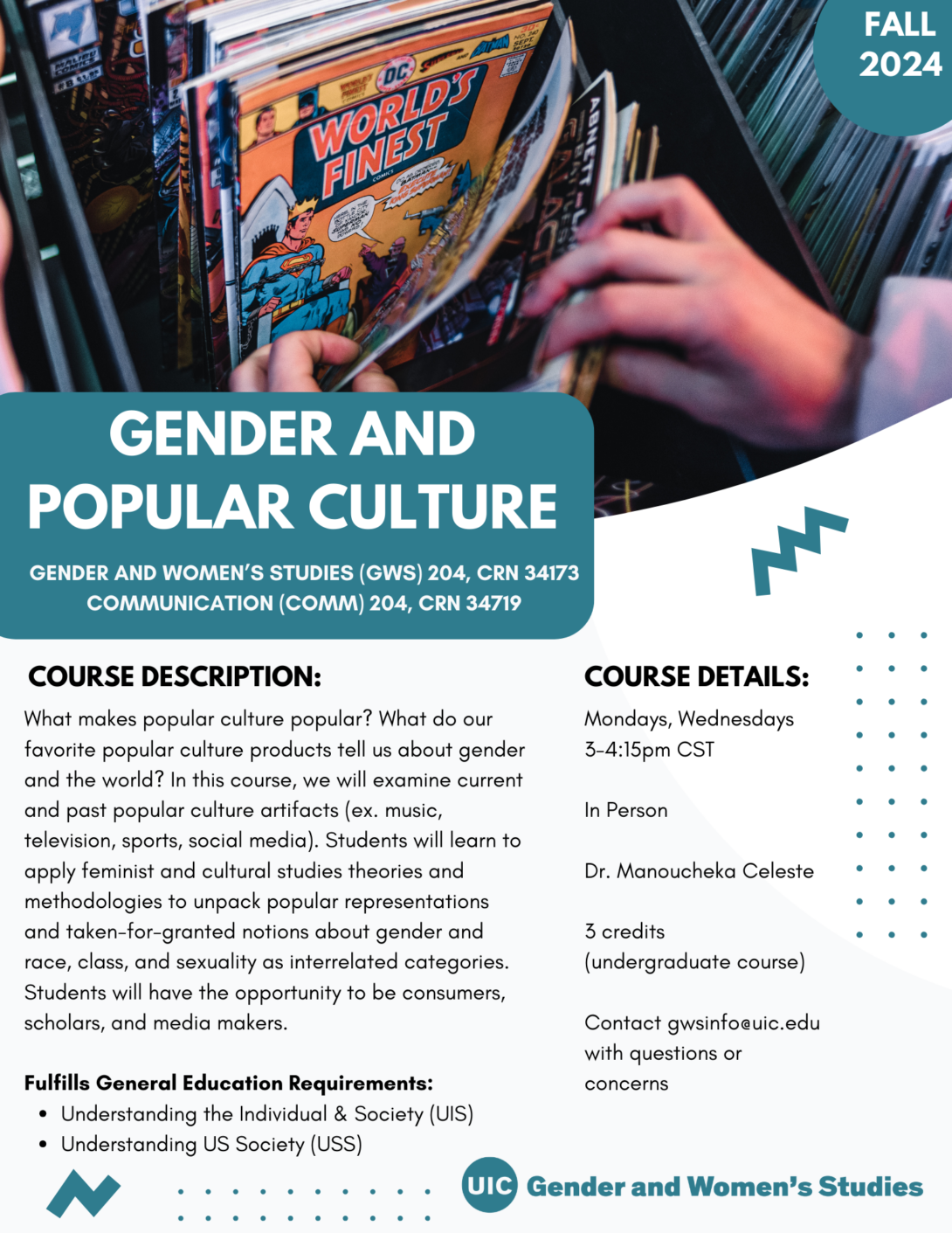
GWS 204 Gender and Popular Culture, CRN 34173
Course Description: What makes popular culture popular? What do our favorite popular culture products tell us about gender and the world? In this course, we will examine current and past popular culture artifacts (ex. music, television, sports, social media). Students will learn to apply feminist and cultural studies theories and methodologies to unpack popular representations and taken-for-granted notions about gender and race, class, and sexuality as interrelated categories. Students will have the opportunity to be consumers, scholars, and media makers.
Fulfills General Education Requirements:
Understanding the Individual & Society (UIS)
Understanding US Society (USS)
Course Details:
In Person, Mondays and Wednesdays 3-4:15 p.m. CST
Instructor: Dr. Manoucheka Celeste
3 credits (undergraduate course)
GWS 292 Heading link
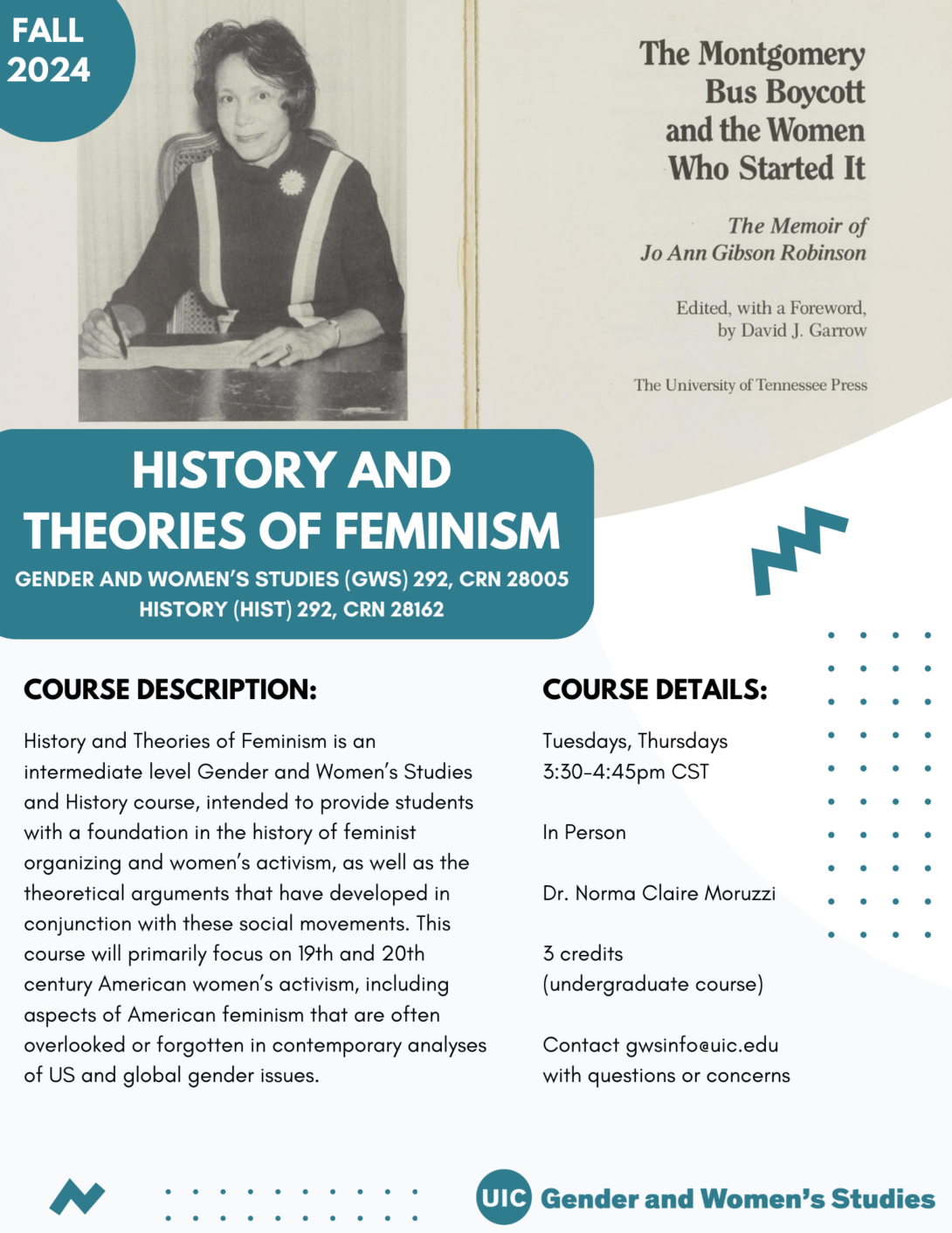
GWS 292 History and Theories of Feminism, CRN 28005
Course Description: History and Theories of Feminism is an intermediate level Gender and Women’s Studies and History course, intended to provide students with a foundation in the history of feminist organizing and women’s activism, as well as the theoretical arguments that have developed in conjunction with these social movements. This course will primarily focus on 19th and 20th century American women’s activism, including aspects of American feminism that are often overlooked or forgotten in contemporary analyses of US and global gender issues.
Course Details:
In Person, Tuesdays and Thursdays 3:30-4:45 p.m. CST
Instructor: Dr. Norma Claire Moruzzi
3 credits (undergraduate course)
GWS 345 Heading link
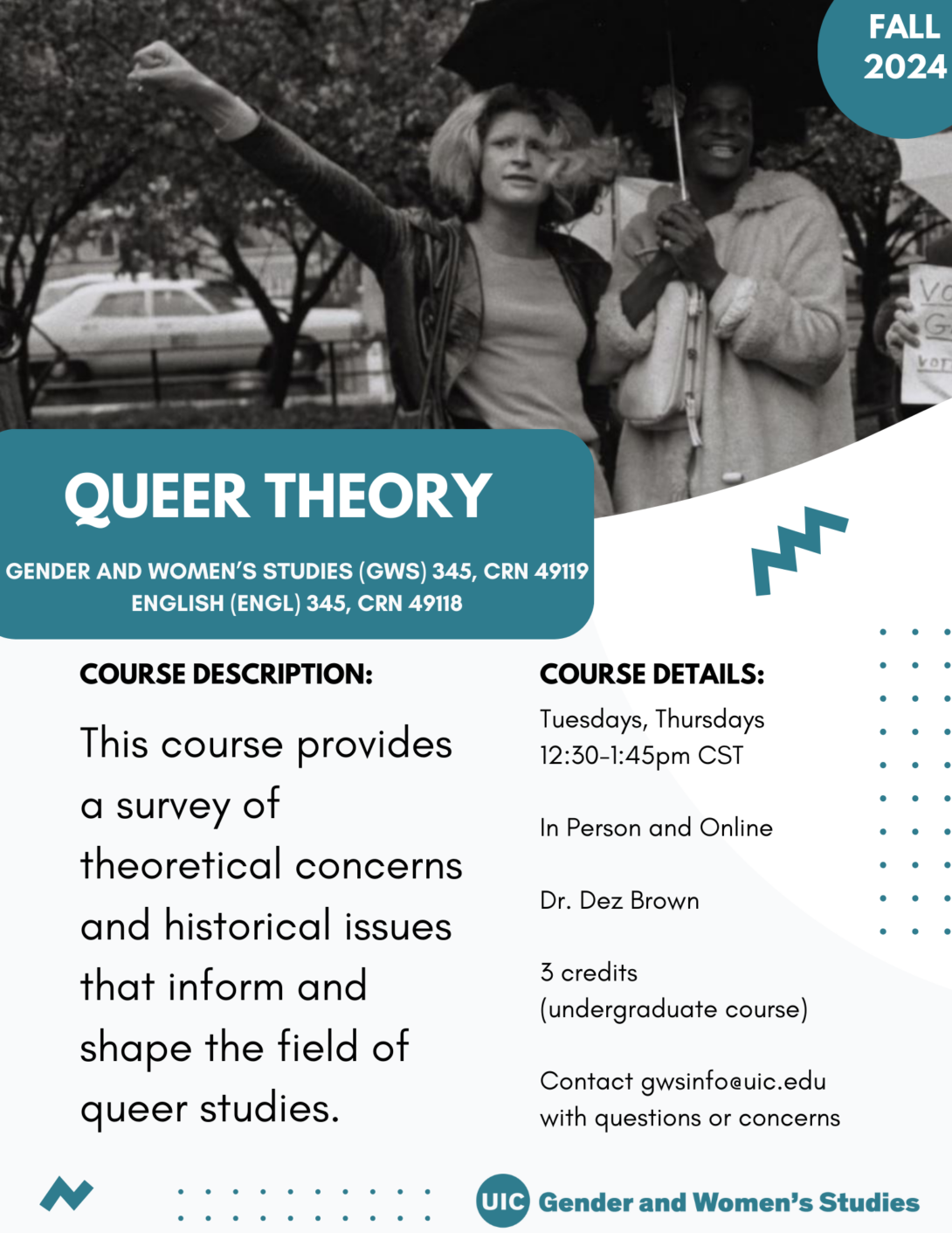
GWS 345 Queer Theory, CRN 49119
Course Description: This course provides a survey of theoretical concerns and historical issues that inform and shape the field of queer studies.
Course Details:
Hybrid (In Person and Online), Tuesdays and Thursdays 12:30-1:45 p.m. CST
Instructor: Dr. Dez Brown
3 credits (undergraduate course)
GWS 390 Heading link
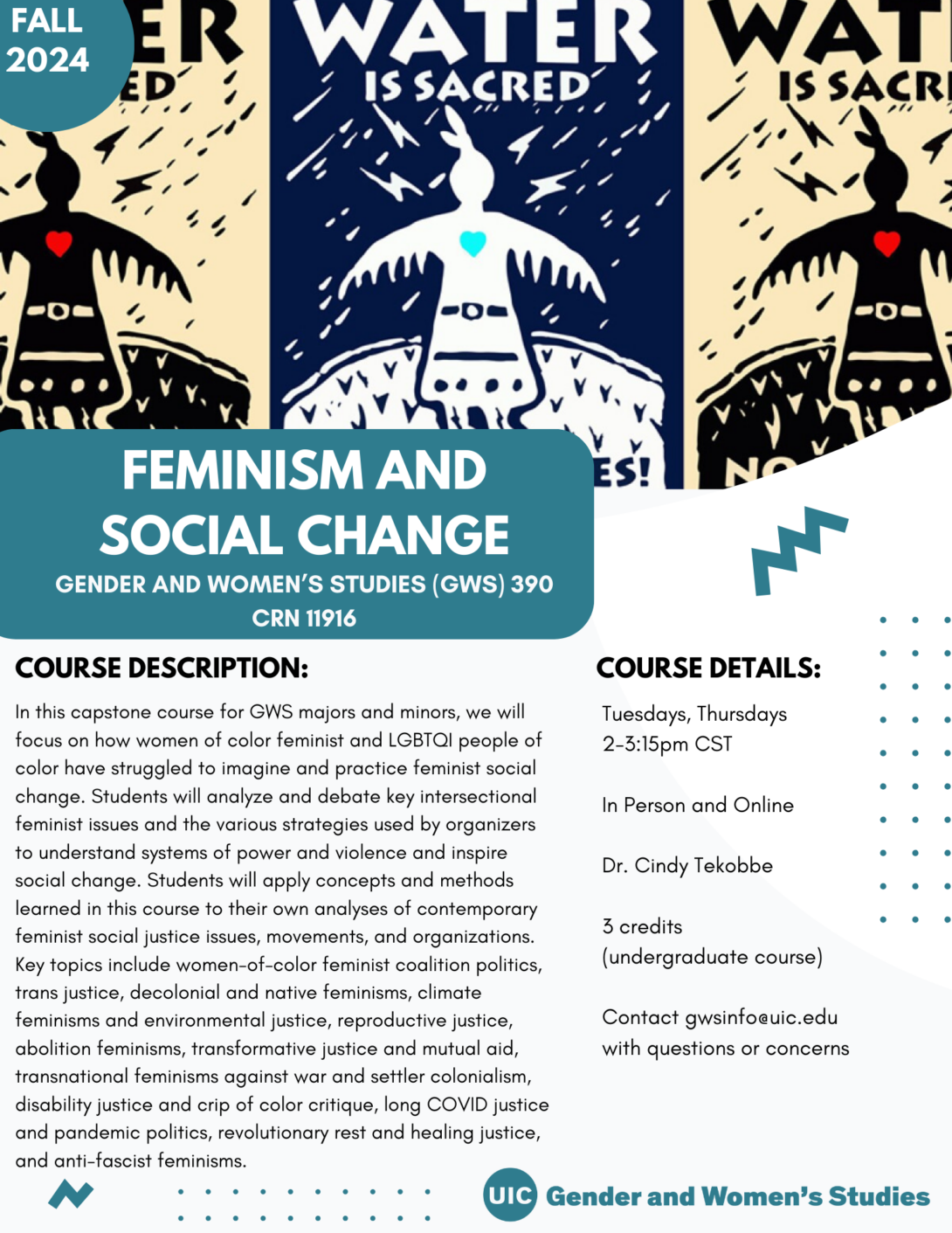
GWS 390 Feminism and Social Change, CRN 11916
Course Description: In this capstone course for GWS majors and minors, we will focus on how women of color feminist and LGBTQI people of color have struggled to imagine and practice feminist social change. Students will analyze and debate key intersectional feminist issues and the various strategies used by organizers to understand systems of power and violence and inspire social change. Students will apply concepts and methods learned in this course to their own analyses of contemporary feminist social justice issues, movements, and organizations. Key topics include women-of-color feminist coalition politics, trans justice, decolonial and native feminisms, climate feminisms and environmental justice, reproductive justice, abolition feminisms, transformative justice and mutual aid, transnational feminisms against war and settler colonialism, disability justice and crip of color critique, long COVID justice and pandemic politics, revolutionary rest and healing justice, and anti-fascist feminisms.
Course Details:
Hybrid (In Person and Online), Tuesdays and Thursdays 2-3:15 p.m. CST
Instructor: Dr. Cindy Tekobbe
3 credits (undergraduate course)
GWS 403 Heading link
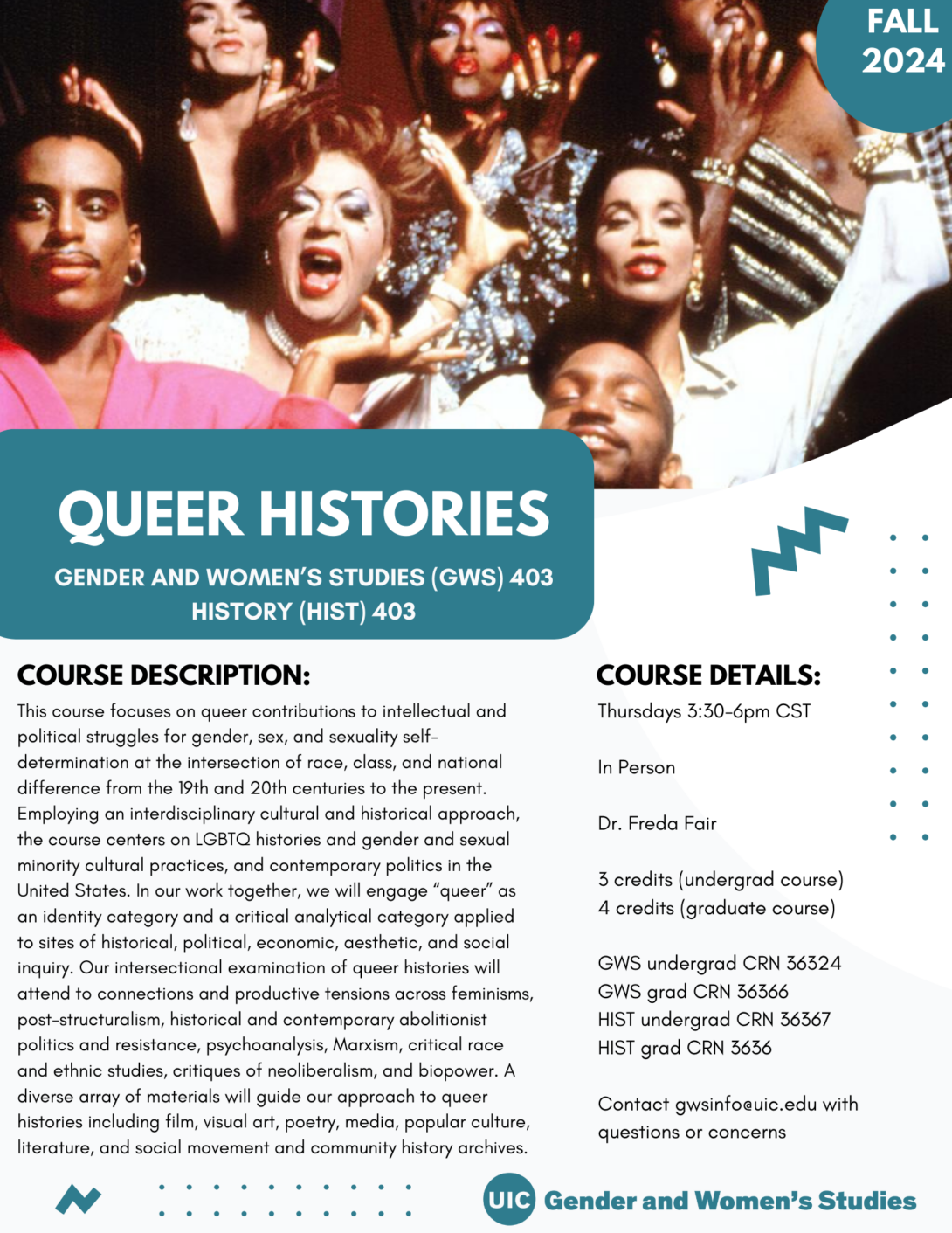
GWS 403 Queer Histories, CRN 36324 (undergrad) and 36366 (grad)
Course Description: This course focuses on queer contributions to intellectual and political struggles for gender, sex, and sexuality self-determination at the intersection of race, class, and national difference from the 19th and 20th centuries to the present. Employing an interdisciplinary cultural and historical approach, the course centers on LGBTQ histories and gender and sexual minority cultural practices, and contemporary politics in the United States. In our work together, we will engage “queer” as an identity category and a critical analytical category applied to sites of historical, political, economic, aesthetic, and social inquiry. Our intersectional examination of queer histories will attend to connections and productive tensions across feminisms, post-structuralism, historical and contemporary abolitionist politics and resistance, psychoanalysis, Marxism, critical race and ethnic studies, critiques of neoliberalism, and biopower. A diverse array of materials will guide our approach to queer histories including film, visual art, poetry, media, popular culture, literature, and social movement and community history archives.
Course Details:
In Person, Thursdays 3:30-6 p.m. CST
Instructor: Dr. Freda Fair
3 credits (undergraduate course)
4 credits (graduate course)
GWS 501 Heading link
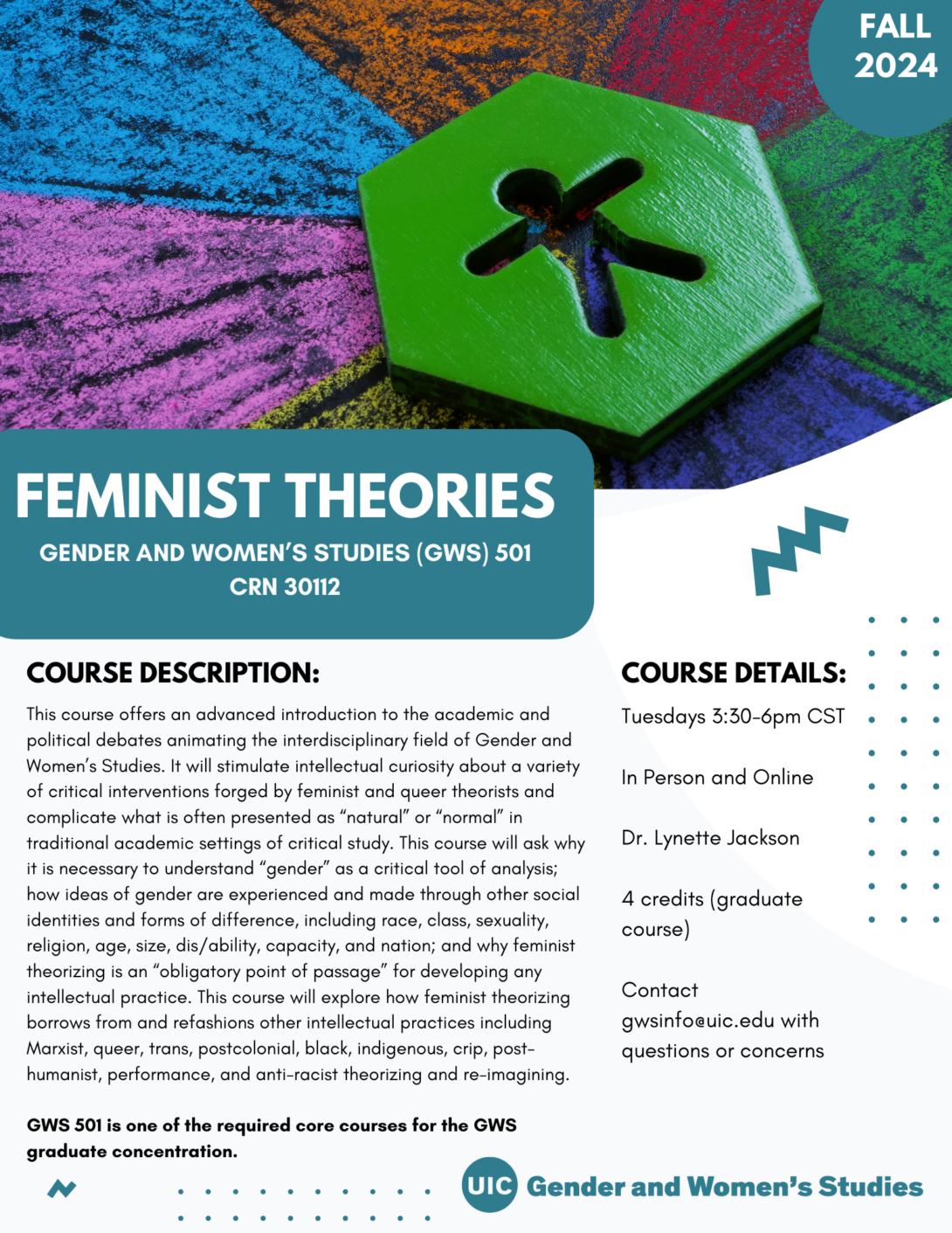
GWS 501 Feminist Theories CRN 30112
Course Description: This course offers an advanced introduction to the academic and political debates animating the interdisciplinary field of Gender and Women’s Studies. It will stimulate intellectual curiosity about a variety of critical interventions forged by feminist and queer theorists and complicate what is often presented as “natural” or “normal” in traditional academic settings of critical study. This course will ask why it is necessary to understand “gender” as a critical tool of analysis; how ideas of gender are experienced and made through other social identities and forms of difference, including race, class, sexuality, religion, age, size, dis/ability, capacity, and nation; and why feminist theorizing is an “obligatory point of passage” for developing any intellectual practice. This course will explore how feminist theorizing borrows from and refashions other intellectual practices including Marxist, queer, trans, postcolonial, black, indigenous, crip, post-humanist, performance, and anti-racist theorizing and re-imagining. GWS 501 is one of the required core courses for the GWS graduate concentration.
Course Details:
Hybrid (In Person and Online), Tuesdays 3:30-6 p.m. CST
Instructor: Dr. Lynette Jackson
4 credits (graduate course)
SJ 101 Heading link
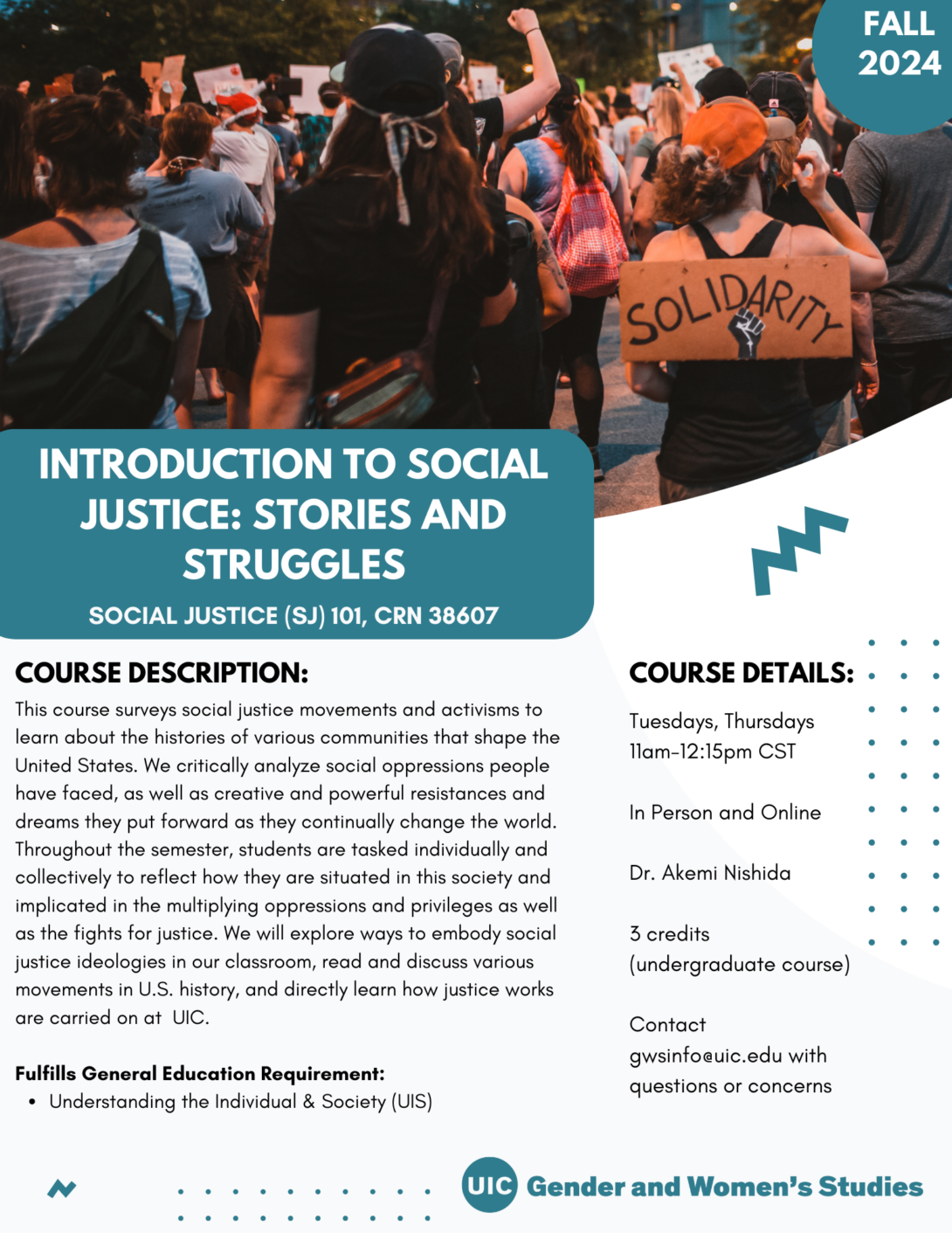
SJ 101 Introduction to Social Justice: Stories and Struggles, CRN 38607
Course Description: This course surveys social justice movements and activisms to learn about the histories of various communities that shape the United States. We critically analyze social oppressions people have faced, as well as creative and powerful resistances and dreams they put forward as they continually change the world. Throughout the semester, students are tasked individually and collectively to reflect how they are situated in this society and implicated in the multiplying oppressions and privileges as well as the fights for justice. We will explore ways to embody social justice ideologies in our classroom, read and discuss various movements in U.S. history, and directly learn how justice works are carried on at UIC.
Fulfills General Education Requirements:
Understanding the Individual & Society (UIS)
Course Details:
Hybrid (In Person and Online), Tuesdays and Thursdays 11 a.m.-12:15 p.m. CST
Instructor: Dr. Akemi Nishida
3 credits (undergraduate course)
SJ 201 Heading link
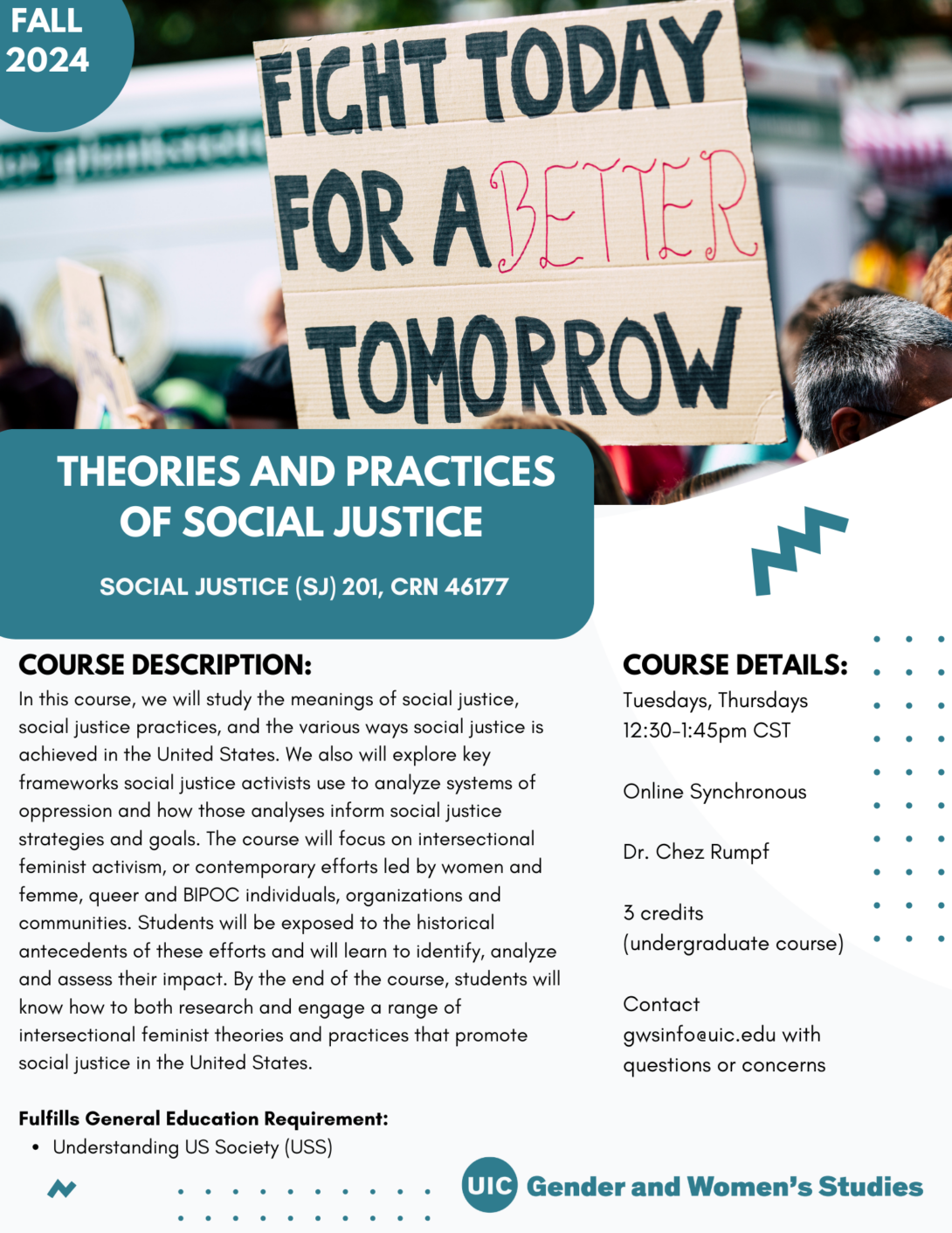
SJ 201 Theories and Practices of Social Justice, CRN 46177
Course Description: In this course, we will study the meanings of social justice, social justice practices, and the various ways social justice is achieved in the United States. We also will explore key frameworks social justice activists use to analyze systems of oppression and how those analyses inform social justice strategies and goals. The course will focus on intersectional feminist activism, or contemporary efforts led by women and femme, queer and BIPOC individuals, organizations and communities. Students will be exposed to the historical antecedents of these efforts and will learn to identify, analyze and assess their impact. By the end of the course, students will know how to both research and engage a range of intersectional feminist theories and practices that promote social justice in the United States.
Fulfills General Education Requirements: Understanding US Society (USS)
Course Details:
Online Synchronous, Tuesdays and Thursdays 12:30-1:45 p.m. CST
Instructor: Dr. Chez Rumpf
3 credits (undergraduate course)